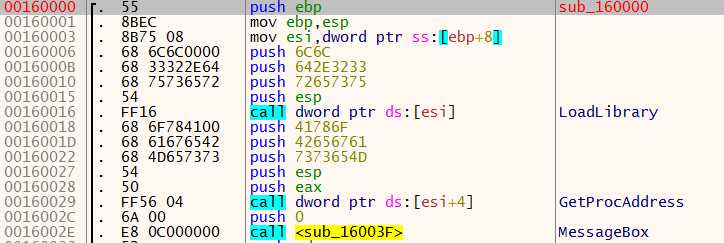第28章:使用汇编语言进行代码注入
Posted rev-omi
tags:
篇首语:本文由小常识网(cha138.com)小编为大家整理,主要介绍了第28章:使用汇编语言进行代码注入相关的知识,希望对你有一定的参考价值。
说白了就是将汇编指令直接转换为IA-32的16进制格式.
// CodeInjection2.cpp // reversecore@gmail.com // http://www.reversecore.com #include "windows.h" #include "stdio.h" typedef struct _THREAD_PARAM { FARPROC pFunc[2]; // LoadLibraryA(), GetProcAddress() } THREAD_PARAM, *PTHREAD_PARAM; BYTE g_InjectionCode[] = { 0x55, 0x8B, 0xEC, 0x8B, 0x75, 0x08, 0x68, 0x6C, 0x6C, 0x00, 0x00, 0x68, 0x33, 0x32, 0x2E, 0x64, 0x68, 0x75, 0x73, 0x65, 0x72, 0x54, 0xFF, 0x16, 0x68, 0x6F, 0x78, 0x41, 0x00, 0x68, 0x61, 0x67, 0x65, 0x42, 0x68, 0x4D, 0x65, 0x73, 0x73, 0x54, 0x50, 0xFF, 0x56, 0x04, 0x6A, 0x00, 0xE8, 0x0C, 0x00, 0x00, 0x00, 0x52, 0x65, 0x76, 0x65, 0x72, 0x73, 0x65, 0x43, 0x6F, 0x72, 0x65, 0x00, 0xE8, 0x14, 0x00, 0x00, 0x00, 0x77, 0x77, 0x77, 0x2E, 0x72, 0x65, 0x76, 0x65, 0x72, 0x73, 0x65, 0x63, 0x6F, 0x72, 0x65, 0x2E, 0x63, 0x6F, 0x6D, 0x00, 0x6A, 0x00, 0xFF, 0xD0, 0x33, 0xC0, 0x8B, 0xE5, 0x5D, 0xC3 }; /* 004010ED 55 PUSH EBP 004010EE 8BEC MOV EBP,ESP 004010F0 8B75 08 MOV ESI,DWORD PTR SS:[EBP+8] ; ESI = pParam 004010F3 68 6C6C0000 PUSH 6C6C 004010F8 68 33322E64 PUSH 642E3233 004010FD 68 75736572 PUSH 72657375 00401102 54 PUSH ESP ; - "user32.dll" 00401103 FF16 CALL DWORD PTR DS:[ESI] ; LoadLibraryA("user32.dll") 00401105 68 6F784100 PUSH 41786F 0040110A 68 61676542 PUSH 42656761 0040110F 68 4D657373 PUSH 7373654D 00401114 54 PUSH ESP ; - "MessageBoxA" 00401115 50 PUSH EAX ; - hMod 00401116 FF56 04 CALL DWORD PTR DS:[ESI+4] ; GetProcAddress(hMod, "MessageBoxA") 00401119 6A 00 PUSH 0 ; - MB_OK (0) 0040111B E8 0C000000 CALL 0040112C 00401120 <ASCII> ; - "ReverseCore", 0 0040112C E8 14000000 CALL 00401145 00401131 <ASCII> ; - "www.reversecore.com", 0 00401145 6A 00 PUSH 0 ; - hWnd (0) 00401147 FFD0 CALL EAX ; MessageBoxA(0, "www.reversecore.com", "ReverseCore", 0) 00401149 33C0 XOR EAX,EAX 0040114B 8BE5 MOV ESP,EBP 0040114D 5D POP EBP 0040114E C3 RETN */ BOOL SetPrivilege(LPCTSTR lpszPrivilege, BOOL bEnablePrivilege) { TOKEN_PRIVILEGES tp; HANDLE hToken; LUID luid; if( !OpenProcessToken(GetCurrentProcess(), TOKEN_ADJUST_PRIVILEGES | TOKEN_QUERY, &hToken) ) { printf("OpenProcessToken error: %u ", GetLastError()); return FALSE; } if( !LookupPrivilegeValue(NULL, // lookup privilege on local system lpszPrivilege, // privilege to lookup &luid) ) // receives LUID of privilege { printf("LookupPrivilegeValue error: %u ", GetLastError() ); return FALSE; } tp.PrivilegeCount = 1; tp.Privileges[0].Luid = luid; if( bEnablePrivilege ) tp.Privileges[0].Attributes = SE_PRIVILEGE_ENABLED; else tp.Privileges[0].Attributes = 0; // Enable the privilege or disable all privileges. if( !AdjustTokenPrivileges(hToken, FALSE, &tp, sizeof(TOKEN_PRIVILEGES), (PTOKEN_PRIVILEGES) NULL, (PDWORD) NULL) ) { printf("AdjustTokenPrivileges error: %u ", GetLastError() ); return FALSE; } if( GetLastError() == ERROR_NOT_ALL_ASSIGNED ) { printf("The token does not have the specified privilege. "); return FALSE; } return TRUE; } BOOL InjectCode(DWORD dwPID) { HMODULE hMod = NULL; THREAD_PARAM param = {0,}; HANDLE hProcess = NULL; HANDLE hThread = NULL; LPVOID pRemoteBuf[2] = {0,}; hMod = GetModuleHandleA("kernel32.dll"); // set THREAD_PARAM param.pFunc[0] = GetProcAddress(hMod, "LoadLibraryA"); param.pFunc[1] = GetProcAddress(hMod, "GetProcAddress"); // Open Process if ( !(hProcess = OpenProcess(PROCESS_ALL_ACCESS, // dwDesiredAccess FALSE, // bInheritHandle dwPID)) ) // dwProcessId { printf("OpenProcess() fail : err_code = %d ", GetLastError()); return FALSE; } // Allocation for THREAD_PARAM if( !(pRemoteBuf[0] = VirtualAllocEx(hProcess, // hProcess NULL, // lpAddress sizeof(THREAD_PARAM), // dwSize MEM_COMMIT, // flAllocationType PAGE_READWRITE)) ) // flProtect { printf("VirtualAllocEx() fail : err_code = %d ", GetLastError()); return FALSE; } if( !WriteProcessMemory(hProcess, // hProcess pRemoteBuf[0], // lpBaseAddress (LPVOID)¶m, // lpBuffer sizeof(THREAD_PARAM), // nSize NULL) ) // [out] lpNumberOfBytesWritten { printf("WriteProcessMemory() fail : err_code = %d ", GetLastError()); return FALSE; } // Allocation for ThreadProc() if( !(pRemoteBuf[1] = VirtualAllocEx(hProcess, // hProcess NULL, // lpAddress sizeof(g_InjectionCode), // dwSize MEM_COMMIT, // flAllocationType PAGE_EXECUTE_READWRITE)) ) // flProtect { printf("VirtualAllocEx() fail : err_code = %d ", GetLastError()); return FALSE; } if( !WriteProcessMemory(hProcess, // hProcess pRemoteBuf[1], // lpBaseAddress (LPVOID)&g_InjectionCode, // lpBuffer sizeof(g_InjectionCode), // nSize NULL) ) // [out] lpNumberOfBytesWritten { printf("WriteProcessMemory() fail : err_code = %d ", GetLastError()); return FALSE; } if( !(hThread = CreateRemoteThread(hProcess, // hProcess NULL, // lpThreadAttributes 0, // dwStackSize (LPTHREAD_START_ROUTINE)pRemoteBuf[1], pRemoteBuf[0], // lpParameter 0, // dwCreationFlags NULL)) ) // lpThreadId { printf("CreateRemoteThread() fail : err_code = %d ", GetLastError()); return FALSE; } WaitForSingleObject(hThread, INFINITE); CloseHandle(hThread); CloseHandle(hProcess); return TRUE; } int main(int argc, char *argv[]) { DWORD dwPID = 0; if( argc != 2 ) { printf(" USAGE : %s <pid> ", argv[0]); return 1; } // change privilege if( !SetPrivilege(SE_DEBUG_NAME, TRUE) ) return 1; // code injection dwPID = (DWORD)atol(argv[1]); InjectCode(dwPID); return 0; }
调试程序,notepad.exe放X64dbg运行,挂上线程入口断点,运行注入程序,断在入口断点:

首先,生成栈帧,这里的编写方法可以借鉴一下.其次.看看esi被赋予的值:

![]()
此处 ebp+8 就是一个就是一个结构体指针,而这个结构体就是之前写入到 notepad.exe 进程中的数据.
接下来的三个push,实际上是将参数入栈(注意是逆着入栈的):

通过参数 user32.dll ,载入user32.dll 到内存,并返回user32.dll的地址.

同样将字符串 MessageBoxA , user32.dll 入栈, 返回MessageBoxA的函数地址.

后面这两个call 的精妙之处在,没有使用ret,因此堆栈中会留存有 call 指令的下一个地址,即字符串的首地址,他们作为函数的参数入栈:

调用MessageBox后就完成了功能.

以上是关于第28章:使用汇编语言进行代码注入的主要内容,如果未能解决你的问题,请参考以下文章